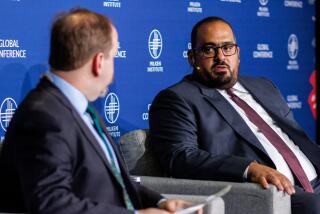Saudis Exert Influence in a More Mature OPEC
- Share via
GENEVA — When the smaller members of the Organization of Petroleum Exporting Countries wanted more costly oil in the 1970s, they had the power to make prices double and double and double again.
This week in Geneva, by contrast, they struggled just to achieve what they hope will be a 20% price increase, and many analysts and even some OPEC members doubt they will get even that.
At work is a combination of economics, oil market dynamics and politics. At the center of the action is Saudi Arabia.
“In the 1970s,” said Philip Verleger Jr., an energy specialist with the Institute of International Economics in Washington, “OPEC was a runaway team on a wagon train, with the Saudis at the reins but powerless to hold it back. Now the Saudis have control.”
OPEC itself has matured since the days when its oil ministers, dressed in colorful native garb, strode across the capitals of Europe and the television screens of America.
“The OPEC of the 1990s is different,” said OPEC Secretary General Subroto, an Indonesian economist whose academic record includes a year each at Stanford and Harvard universities. “We want to project an image of stability and cooperation. We realize that it is in our long-term interest to cooperate with the consuming countries rather than to confront them.”
It is a maturity bred of self-interest--at least the self-interest of OPEC’s mightiest member.
Saudi Arabia denies any such role. “We never look at ourselves as a dominant producer in any way,” Saudi oil minister Hisham Nazer told Reuters news agency Wednesday.
Everyone else does. And even in the 1970s, the Saudis felt their interest lay in moderate oil prices. High prices, they feared, would drive the rest of the world to develop hard-to-reach oil reserves that would otherwise not pay to extract. That in turn would drive down the Saudis’ share of the world oil market.
That was an easy position to take for a nation that was sitting on enough oil to last at least 100 years.
OPEC nations with smaller reserves felt differently. “The Saudis can always dig new wells and jack up production,” said Sam Malin, a senior economist with DRI-McGraw Hill in Paris. “Libya and Ecuador, for example, can’t. So it’s in their interest to get as much as they can for each barrel of oil.”
OPEC Oil Quotas Oil production quotas for the second quarter, as established Tuesday by ministers of the Organization of Petroleum Exporting Countries. Figures are in thousands of barrels per day.
Country Quota Algeria 827 Ecuador 273 Gabon 285 Indonesia 1,443 Iran 3,217 Iraq 0 Kuwait 0 Libya 1,425 Nigeria 1,840 Qatar 399 Saudi Arabia 8,034 United Arab Emirates 2,320 Venezuela 2,235 Total 22,298
More to Read
Sign up for Essential California
The most important California stories and recommendations in your inbox every morning.
You may occasionally receive promotional content from the Los Angeles Times.













